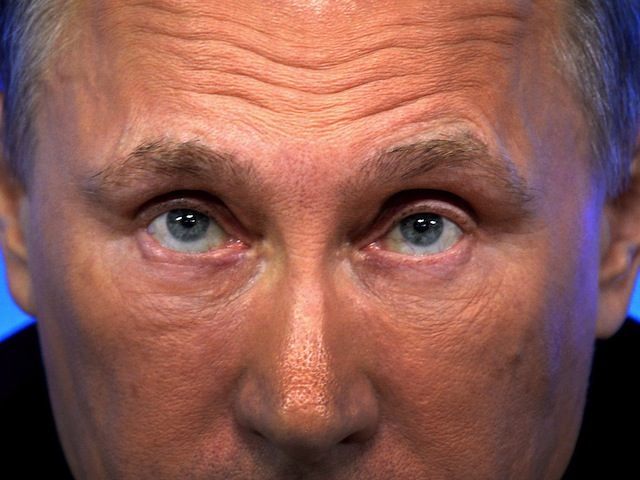The Baltic nations used their platforms at the UN Security Council to protest Russian President Vladimir Putin. In the past 20 months, Russia has threatened the three former Soviet republics repeatedly, which has forced the governments to amp up security.
Lithuania, Latvia, and Estonia all addressed the massive conflict in Ukraine, which soured relations between Russia and the West. The presidents of the individual countries criticized the UN for not punishing those who violated the UN Charter and pushed for reforms in the UN Security Council, since Russia consistently uses its veto privilege to stop investigations against them.
Lithuanian President Dalia Grybauskaitė has been one of Putin’s fiercest and most vocal critics since he invaded Ukraine and annexed Crimea. She did not back down in front of the UN.
“In the middle of Europe, the UN Charter has been breached with no consequences,” she said, adding:
Last year, Russia annexed the Crimea. The Kremlin seeks to rewrite history and to redraw the borders of post-war Europe. Even in the context of the multiple crises and security challenges the world is facing today, the annexation of Crimea and military aggression in eastern Ukraine stands out because of the implications of the future of international peace and security.
Russia invaded eastern Ukraine and annexed the peninsula after Parliament ousted Russian-backed President Viktor Yanukovych in February 2014. The UN Security Council and other countries vowed to aid Ukraine, but many only handed over words.
“We cannot pledge respect for the UN Charter and ignore its breaches at the same time,” she continued, then asserted:
Our collective failure to stand up for the underlying principles of independence, sovereignty, unity, and territorial integrity of Ukraine would have far-reaching negative repercussions for the international order. The occupied territories of Ukraine, Georgia, and Moldova are full of red lines that we have drawn ourselves, but never acted upon. Again, we are reminded if you close your eyes to the crimes, they do not disappear, but spread, grow, and finally they take over.
Estonian President Toomas Hendrik Ilves expressed these same concerns on Monday. After Crimea’s annexation, a Russian diplomat told the UN Human Rights Council the Kremlin is worried about Russian speakers in Estonia. The government immediately added more security like Lithuania. Ilves told the UN they are all responsible “to put an end to the aggression against Ukraine.”
“Compared to a year ago, the armed conflict in eastern Ukraine is less intense, but daily fighting continues,” Ilves stated. He added:
Crimea remains illegally occupied. Those responsible for the downing of Malaysian airliner MH17 are still at large. Attempts to obstruct justice on this matter are deeply disturbing. Long-standing protracted conflicts in Georgia, Moldova, and Nagorno-Karabakh remain unresolved.
Latvian President Raimonds Vējonis lashed out at those who violate the Charter and the presidency of the UN for not punishing those responsible.
“However, far too often international order and principles have been violated and the UN has been unable to prevent conflicts or build peace or to stop atrocities,” he said. “Past failures must be lessons for the future. The UN, and in particular the Security Council, must be able to implement the mission set by the Charter with a renewed sense of responsibility.”
On July 17, 2014, Malaysian Airlines flight MH17 crashed into a sunflower field in eastern Ukraine, killing all 298 people on board. Intelligence from America and Germany say the pro-Russians in east Ukraine shot down the plane with a Buk surface-to-air-missile. The five countries in charge of the investigation sought to form a United Nations tribunal to prosecute those responsible. However, Russia vetoed the United Nations Security Council move, while China, Angola, and Venezuela abstained from voting. On the 15-member council, the “resolution needs nine votes in favor to pass and no veto by Russia, the United States, China, Britain, or France.”
“Vetoing a Security Council resolution to commemorate the Srebrenica massacre or a tribunal for the downing of MH17 is unjustifiable and an insult to the memories of the victims,” declared Grybauskaitė, adding:
It also raises questions about the relevance in the 21st century of the Security Council as it is today. For the Council to maintain its credibility the least it can do is put an end to the veto in the cases of genocide, atrocity crimes, crimes against humanity, and war crimes.
Her thoughts echoed Ilves’ beliefs on the Security Council. He expressed disappointment in the Council when it “failed to act due to the use of the veto.” He urged members not to “vote against actions aimed at preventing and stopping mass atrocity crimes.”
“There is a clear necessity to make Security Council reform a reality,” said Ilves.
Vējonis agreed with his counterparts.
“Latvia supports the proposal to voluntarily restrain the use of the veto at the Security Council in situations involving mass atrocity crimes,” he said. “It also supports a Code of Conduct for any member of the Council not to vote against any action designed to end and prevent mass atrocity crimes.”

COMMENTS
Please let us know if you're having issues with commenting.